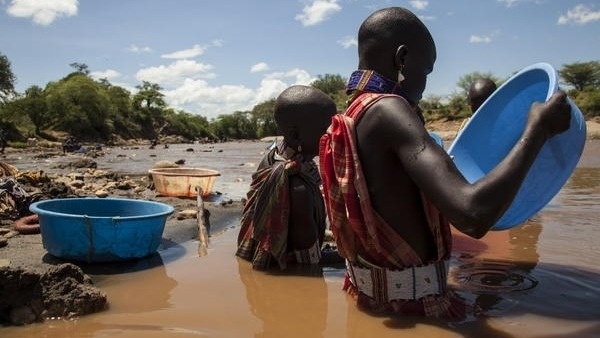Knee-deep in muddy water, Peter Locebe and a long line of other men scour the sand for the sparkle of a speck of gold, back breaking work in the fierce equatorial sun of South Sudan.

“There is so much gold here,” Locebe said, mopping his brow and telling stories of how he once found a whole ounce (30 grams) of gold in a single day from the muddy creeks in this remote and grossly impoverished region.
But while the panners sift the dirt in the hope of making their fortune, the gold here could also turn out to be a much-needed economic lifeline for their fledgling nation.
Experts believe and South Sudan hopes the land holds good potential for larger scale mining, a possible future resource to wean the economy of the world’s youngest nation off an almost total reliance on the pumping of crude oil.
Initial geological assessments suggest South Sudan holds good reserves of iron ore, copper, nickel, platinum and manganese.
“Long term, mining has the potential to replace oil, because oil is seen to be phasing out in about five or 10 years time,” said Rainer Hengstmann, who works for the London-based Adam Smith International advisory firm to support the oil and mining ministry.
Setting up large-scale mining could take from around five to 15 years, he estimates.
As yet, it is nearly virgin territory for explorers, apart from an aerial survey carried out near the main trading post town of Kapoeta here, some 200 kilometers (125 miles) east of the capital Juba.
South Sudan won independence from former civil war foes Sudan in July 2011, taking with it the bulk of the former united country’s oil reserves, a resource that provided 98 percent of Juba’s government revenue.
But bitter arguments and still tense relations with Sudan – who controls all the pipelines the landlocked South need to export crude – showed the danger of near total reliance on a single resource.
South Sudan’s economy was crippled when it shut down crude production for more than a year – restarting only in April – after accusing Khartoum of stealing its oil.
That makes minerals under the soil a literal gold mine for the nation.
Foreign companies lining up but infrastructure lacking
Armed with picks and plastic tubs, the Toposa people here started digging soon after the end of British colonial rule in the 1960s, recruited by traders scooping a fortune by buying a gram of gold for a dollar.
The Toposa, still wearing traditional costumes consisting of little but vast strings colorful beads, have now been joined by an estimated 60,000 artisanal diggers and panners lured by the gold rush.
However, larger companies are expected soon.
Petroleum and Mining Minister Stephen Dhieu Dau says the government is “giving special attention to this sector,” and hopes to provide the first exploration licenses later this year.
Interest is keen, officials say.
“There are so many companies at the door, just queuing to come in,” mining ministry director general Arkangelo Okwang said, adding officials still need to finalize mining regulations to ensure the resource is managed, and becomes a “blessing, not a curse.”
As yet, the formal industry is not even in its infancy.
“Where’s the infrastructure, where’s the power?” asked Hengstmann. “You need roads, a railway…you can’t run a mine on generators.”
But hand digging miners are already pulling out impressive hauls.
A gram sells for between 36 to 47 dollars said Kenyan trader Samuel Mutham Kivuva, a spokesman for around a thousand foreign middlemen in the gold trade, allowing a small profit for resale down the line.
He claims around five kilograms of gold leaves Kapoeta each week. That represents around a $1m in golden nuggets and dust a month.
More than double that amount was reportedly being shipped out last year before metal detectors were outlawed by mining ministry officials.
The government has vowed to stop the gold smuggling across the border, and start taxing the gold leaving freely from the country.
“There are border customs but they don’t check people’s pockets,” said Kapoeta commissioner Martin Lorika.
But many across the region are attracted to Kapoeta, whose dusty streets and simple shacks exude the air of a Wild West frontier town, rife with rumors of shady business deals.
One western mining analyst even alleges Somali pirates send associates to launder potentially marked dollars bills from ransom payments by buying pure gold more easily smuggled for sale in Dubai.
International firms may come in the future, but for the moment, business is for only the brave.
“This is a land where if you think of investing…you need a proper godfather,” Kivuva warned.
Source: AFP








